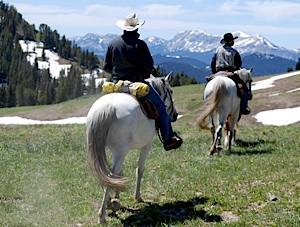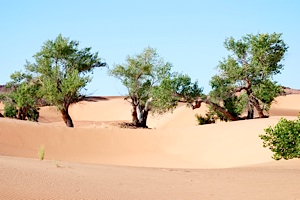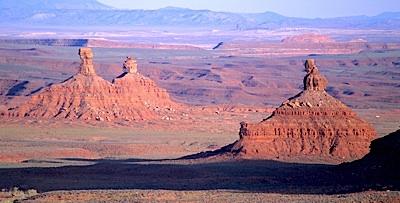Though national parks, per se, haven't come up during any of the debates among the Republican presidential candidates, their statements on federal lands in general look down upon the public landscape.
* “I don’t know why the government owns so much of this land.” -- Mitt Romney, during an appearance in Reno, Nevada, on February 2.
* “I want as much federal land to be turned over to the state(s) as possible.” -- Rep. Ron Paul, during an appearance in Elko, Nevada, on February 2. Mr. Paul also has called for the elimination of the Interior Department.
*"We need to get [federal lands] back into the hands of the states and even to the private sector.” -- Former U.S. Sen. Rick Santorum, during an appearance in Boise, Idaho, on Valentine's Day.
Sadly, these views are shortsighted.
Were it not for the foresight of earlier Congresses that retained key parcels of land as states were carved out, we would not have places such as Yellowstone, Rocky Mountain, and Glacier, nor would we have invested in landscapes that became Acadia, Great Smoky, and Shenandoah national parks.
Lacking that investment, we'd be the lesser for it. These treasures were protected when the specter of losing them to development wasn't even a glimmer on the national time-line—much less now, when development is omnipresent and we'd be "selling off" lands—Forest Service lands, Bureau of Land Management Lands—that are increasingly essential buffers around the priceless parks we are lucky to have. When you look at the Smokies, or Shenandoah, or Acadia, these incomparable landscapes are among some of the most-visited in the National Park System.
The federal government created these prized parks by having to go "back" into the private land market—and even those efforts, more than 75 years ago, took unbelieveable foresight and generated amazing controversy. To argue that we turn what public land we have rescued from a densely developed future back to private or even state ownership is irresponsible when in all likelihood there will be no opportunity to reverse that decision if we take it.

The Wyoming Range is part of the Bridger-Teton National Forest. How might its management change if the federal government relinquished it? Kurt Repanshek photo.
How big would the Tongas National Forest in Alaska be, the Routt National Forest in Colorado, or the Sam Houston National Forest in Texas if Washington took a dim view on public lands and handed, or auctioned, them off?
Imagine the appearance of places such as the national forests surrounding Yellowstone were they turned over to the states or private hands, the broad sweep of lodgepole pine that stretches before you from atop Galena Pass in central Idaho, or even the wild seashore that is Cape Lookout National Seashore if it were given over for development.
The Public Deserves And Needs Public Lands
We need these lands in the public estate so we all might enjoy them, so we can get away from the rush of society and downshift a bit into the more relaxed flow of nature, so not every inch of the country is auctioned off to the highest dollar, for it might not be the wisest dollar.
That's not some anti-capitalistic view, either. Natural ecosystems such as Congaree National Park in South Carolina, the Tallgrass Praire National Preserve in Kansas, and Redwood National and State Parks in California, just to name three, are more than the sum of what they cost to maintain in tax dollars.
These assets already bear economic fruit in their present form. These natural resources—not to mention the very busiest, iconic units of the National Park system—spawn tens of millions of dollars for local communities and businesses nationally in purchases tied to recreation and tourism.
But beyond the pure dollars and cents value that can be placed on them, there's the intrinsic value of their simple existence. We need them for their clear air and clean water, their rugged and rumpled forests, their wildlife. Places such as the barrier islands off the East and Gulf coasts provide measures of protection for the mainland against hurricanes and tropical storms. Healthy forests provide protection against erosion and serve as water reservoirs and filters, as well as carbon sinks.
In the current economy, a number of states are closing their state parks as cost-saving measures. How can the Republican candidates for president assume they'd be able to take over federal lands and manage them as they deserve to be managed? And then there's the unknown that exists in these landscapes. At Great Smoky Mountains National Park, nearly 7,400 species, including some 922 totally new to science, have been discovered since the All-Taxa Biodiversity Inventory began in 1998. How many of those might be beneficial in some form to human life, either through medical discoveries or pollution combatants?
The value of public lands isn't lost on Westerners, among the most traditionally conservative voters in the country. A survey of Westerners shows overwhelming support for conservation of the landscape, with strong pluralities agreeing that "national parks, forests, monuments and wildlife areas, are an essential part" of their state economies.
In the states of Wyoming, Utah, Arizona, Colorado, New Mexico and Montana, some of which rank politically among the "reddest" states in the country, the survey showed a broad bipartisan support for a clean, healthy environment. Beyond providing for a clean environment and a recreational outlet, public lands also contribute to the country's energy needs. While granting leases for coal, natural gas, and oil extraction, the government also takes in billions of dollars in royalties that generate PILT (payment in lieu of taxes) payments for the states, helps fund the federal Land and Water Conservation Fund that pays for conservation land purchases, and are shared with state governments outright.
In Utah, where U.S. Rep. Rob Bishop and Republicans in the state Legislature want the federal government to transfer all federal lands, outside of national parks and designated wilderness areas, the state received $34.6 million in PILT payments in FY2011, second only to the $38 million the state of California received.
That $34.6 million sent to Utah is frosting atop the estimated $6.5 BILLION in tourism spending the state's collection of national parks, monuments, and historic sites generated in 2010. As the country expands development of renewable energy, large tracts of public lands are needed for solar and wind energy projects. Would they be possible if these landscapes were privately owned?
Public Lands Bring Economic Value Without Being Developed
It's well understood that there is significant economic value in public lands and the ecosystems they contain and protect. But there's also concern that societies across the world are either not appreciating this intrinsic value, or are consuming it as they might any other natural resource, such as timber. But these landscapes are not self-renewing.
"... the problem of global ecological scarcity is becoming more acute, not less," notes Edward B. Barbier in his latest book, Capitalizing on Nature, Ecosystems as Natural Assets. "If we believe that ecosystems are essential natural assets, and that we should be formulating policies and management strategies to conserve more ecosystems rather than allowing them to disappear, humankind is clearly doing a poor job of it."

Part of the BLM landscape in Utah, White Wash Dunes is an ecologically sensitive and unique area. Kurt Repanshek photo.
Our public landscape is woven through our society in terms of recreation, logging and mining, agriculture, natural beauty and even in our history in places such as Hubbell Trading Post and the Oregon Trail.
To pare away this heritage would be wrong.
For years and years Republicans at the state and national level have led the way or been willing partners with Democrats in a vision of "conservation" as a "conservative" value. That heritage—and sadly, a long list of landmark accomplishments achieved under it—are being rolled back right now by an overzealous group of partisans pushing the idea that the sale or exploitation of our national lands is a quick way to boost the economy or cut the deficit.
In reality, those lands are "riches in our national bank account" that should be husbanded not only for the "potential" of future generations—but also to address the equally or more pressing "problems" those generations may face. Like borrowing too much money or buying too much house, liquidating that bank account of national lands is not only not "conservation," it's not "conservative." It is much more like the policies that "got us into this mess" than it is a way out.




Comments
@Justin Let's see, if we're truly talking about "all" federal land, wouldn't that include a whole bunch of stuff besides national parks? Like all military bases, national labs, testing grounds and federal goverment owned offices throughout the country, including the capitol and the White House? Can anyone really believe any of these candidates really want to turn over "all" federal land? Not to mention that the quotes above are taken out of context.
"Can anyone really believe any of these candidates really want to turn over 'all' federal land?"
I should hope not.
At the moment, the annual insanity of Utah's legislature (commonly referred to as the "loonislature" by many of us) is in full roar. Here are some quotes from an article in the Salt Lake Tribune:
Bill would let Utah cities, counties claim federal land
Cities and towns could use eminent domain
power to confiscate federal land in the state, part of a package of
bills aimed at instigating a court battle seeking state control over
tens of millions of acres in Utah.
Rep. Mike Noel, R-Kanab, argued that
environmentalists are closing down federal lands and federal agents are
arresting people on roads through federal land.
“I for one am not going to put up with it
anymore,” said Noel. “If you care about education, if you care about
being a sovereign state, stand up and do the right thing.”
Rep. Ken Sumsion, R-American Fork, who is
running for governor, said the bill could generate trillions of dollars
for Utah’s economy and help Utah’s schools, which receive less per
student than any other state.
The bill passed the House 57-14 and moves to the Senate for consideration.
It continues:
But Rep. Chris Herrod, R-Provo, said in a
recent interview that the governor and attorney general opted to go to
court to try to claim ownership of federal lands instead, and questioned
Gov. Gary Herbert’s commitment to confronting the federal government.
Sumsion’s eminent domain bill is one of
several bills moving through the Legislature that seeks to seize control
of federal lands.
And finally:
Other bills are giving Congress a deadline to
relinquish control of federal land within the state’s borders and
setting the stage for a court battle if Congress fails to do so.
The legislation would give the state the
authority to allow drilling, mining, grazing and timber cutting inside
National Parks before they are returned to the federal government.
You may read the whole thing at:
http://www.sltrib.com/sltrib/politics/53600115-90/federal-state-utah-bil...
@ Lee - I didn't see that last paragraph in the article you cited. Could you provide the source where that came from, or better yet, identify the actual bill so we can read the actual language.
I just sent the following email to Tribune writer Robert Gehrke. When I get a reply I'll post it here:
It appears that your article "Bill would let Utah cities,
counties claim federal lands" has been modified overnight. This
morning the final paragraphs read:
Sumsion’s eminent-domain bill is one of
several bills moving through the Legislature that seeks to seize control
of federal lands.
Other bills are giving Congress a deadline to
relinquish control of federal land within the state’s borders and
setting the stage for a court battle if Congress fails to do so.
Yesterday it read:
Other bills are giving Congress a deadline to
relinquish control of federal land within the state’s borders and
setting the stage for a court battle if Congress fails to do so.
The legislation would give the state the
authority to allow drilling, mining, grazing and timber cutting inside
National Parks before they are returned to the federal government.
Will you explain the difference for me?
Here's a link to an article in this morning's Deseret News:
http://www.deseretnews.com/article/765554713/Counties-could-seize-federa...
Here is Robert Gehrke's reply:
Robert Gehrke [email protected] 9:02 AM (13 minutes ago)
assume the graf got cut from the print edition and they replaced the
online edition with the print version ... which isn't really supposed to
happen.
The bill hasn't changed. It sill gives the state the authority over mining, grazing, etc.
-----------------
Robert Gehrke
The Salt Lake Tribune
(o) 801.257.8730
(c) 801.707.9929
[email protected]
Twitter: @RobertGehrke
His phone numbers are there. Call and ask if you don't understand his reply.
I would still like to know the name and number of the bill to see what it actually says as opposed to what you or Gehrke say it says.